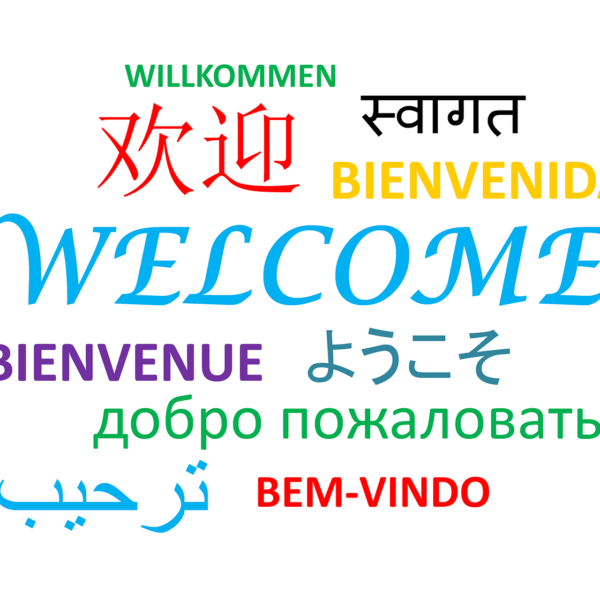“Welcome” Seems To Be The Hardest Word
Autism Consecrated is kicking off our Pastoral Inclusion of Autism Series!
Whether you are reading this as an autistic person or someone who serves the community in some way, this next wave of posts on pastoral inclusion of autism will hopefully spark thoughts and ideas applicable to anyone. While many of these points seem simple, their implications run quite deep.
Part One: “Welcome” Seems To Be The Hardest Word
by Aimée O’Connell
In my career, I have done a great deal of consulting: first as a school psychologist, then as a family support liaison for adults living with mental illness, and most recently with ministry volunteers looking to be more welcoming and inclusive toward those on the autism spectrum. I find it exhilarating to demystify and humanize things like learning disabilities, mental illness and autism, which our culture tends to classify as conditions separating people from the ability to achieve what we collectively call “success” – that is to say, a sense of ease and accomplishment with our lives, our identities, and our relationships. Our culture so greatly values individual achievement that there is an unspoken sense of “yes, but” when a person needs help to attain what the majority can do independently. Thus, when someone identifies with one of these conditions upfront, we unconsciously equate that with needing help – whether we are the people disclosing their conditions or the ones standing by.
With autism awareness growing over the past decade, there is a proliferation of information available in print and online to describe autism to those not yet familiar with what this means. There are descriptions coming from clinical sources which outline the situations most likely to be difficult for autistic people, and there are resources developed by autistics themselves describing which accommodations are helpful. Somewhere in the middle are articles and checklists which provide detailed ways to help autistic people feel comfortable and accepted.
I want to make a strange suggestion: I would like to propose skipping over all that information.
Do you want to help your community be more welcoming and accessible to autistics? Start by asking yourself anthropologically what any community does to express “welcome.” Some of it is overt, even including signage using that word, but much of it is completely unspoken, with the expectation that those who show up want to be here, are able to participate, and have something worthwhile to contribute. Generally, “welcome” is a signal that says we are at ease with newcomers joining our group and that we feel confident that participants have the capacity to be here. “Welcome” is a statement of approval and acceptance into the community.
At the risk of being absurd, I say that “welcome” does not take the time to study newcomers or approach them as puzzles to solve. “Welcome” does not make clinical assessments at the door or convene task forces to study how to restructure activities, modify the environment or come to the aid of the less-able.
If we know all of this intuitively, then making our community welcoming and accessible to autistics is a matter of signaling that we are at ease with autistics joining our group, and that we feel confident they have the capacity to be here.
All that other stuff can happen further down the road, if it seems helpful or appropriate. Want to better appreciate what it’s like to be autistic? Ask us, or read about autism… but, do that after you invite us in and assure us that our being there is important. Want to make autistic people more comfortable or better able to participate in the activities at hand? Ask us, or read about ways to do so… but, do that after you invite us in and assure us that our being there is important.
“Solving the problem of autism” ahead of time may be efficient, but it necessarily tags us as a problem. That does not feel very welcoming.
Of course, it is important to know what makes an autistic person comfortable and optimizes our ability to participate. That comes after (and because of) the welcome. A core list of considerations for autistic well-being includes sensory regulation, physical space, preferred communication style, social participation and personal interests. As part of sensory regulation, it is important to consider lighting, acoustics, decibel level, textures, temperatures, ability to move around, ambient aromas and visual layout. Dietary preferences and supports are also an important consideration.
None of this is terribly cumbersome, and none of this is any one person’s responsibility. In fact, it ought to be viewed in terms of partnership. Autistic people want to participate optimally wherever we go, so as a matter of course, we are motivated toward configuring our considerations as best we can in any given situation. While no community or situation can match every ideal, autistic people are excellent collaborators in anticipating which situations may be more difficult to navigate and which may be made easier. Knowing that the community is equally interested in supporting our well-being reflects the welcome we received in the beginning. It is a natural consequence of being genuinely accepted, as implied by “welcome” itself.
Unfortunately, “welcoming” people with differences can quickly morph into, or be supplanted by, anxiety to accommodate. “Problem-solving” may sound empowering, but in truth, such focus poses a greater barrier to inclusion than any reluctance to understand or accommodate. Problem-solving defers welcoming the person by looking instead at what the community might be asked to do differently if this person is allowed in.
“Welcome” is a subtle but powerful word. In keeping with its purest meaning, the challenge then becomes redefining how we carry that out.


